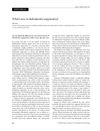 12 citations,
July 1993 in “The journal of investigative dermatology/Journal of investigative dermatology”
12 citations,
July 1993 in “The journal of investigative dermatology/Journal of investigative dermatology” Certain sex hormones and antiandrogens can either slow down or speed up the growth of human hair follicle cells depending on their concentration.
 4 citations,
July 2017 in “Medicine”
4 citations,
July 2017 in “Medicine” The document concludes that managing PCOS involves lifestyle changes, medication for symptoms, and weight loss for fertility improvement.
8 citations,
March 2008 in “Deutsche medizinische Wochenschrift/Deutsche Medizinische Wochenschrift” Adding estrogen increased bone mass in a transsexual man undergoing hormone therapy.
52 citations,
July 1998 in “Urology” Liarozole may be more effective than cyproterone acetate for treating advanced prostate cancer, with better PSA response and survival rates, while maintaining quality of life.
 December 1989 in “Inpharma (Balgowlah)”
December 1989 in “Inpharma (Balgowlah)” Cyproterone helps women with hair loss caused by genetics. More research is needed to confirm the best dose.
 305 citations,
February 2007 in “Hormone and metabolic research”
305 citations,
February 2007 in “Hormone and metabolic research” Human skin makes sexual hormones that affect hair growth, skin health, and healing; too much can cause acne and hair loss, while treatments can manage these conditions.
3 citations,
May 2002 in “PubMed” The document concludes that treatment for excessive hair growth depends on the cause, with options including hair removal methods and medications like anti-androgens or insulin-sensitizing drugs.
 March 2002 in “Reactions Weekly”
March 2002 in “Reactions Weekly” Some birth control pills increase blood clot risk; use them for specific conditions only.

research Acne
81 citations,
January 2002 in “American journal of clinical dermatology” Hormonal treatments can help with acne, especially in women, by lowering androgen levels or blocking their effects.
9 citations,
December 1987 in “European journal of endocrinology” The treatment significantly reduced hair growth and male hormone levels in hirsute women.
Hirsutism is excessive male-pattern hair growth in women, often treated cosmetically or with hormone therapy if contraception is also desired.
15 citations,
November 1983 in “British journal of dermatology/British journal of dermatology, Supplement” Testosterone increases hamster hair growth; cyproterone acetate reduces it.
January 2005 in “Farmaceutski glasnik” Minoxidil and finasteride are key treatments for hair loss.
Cyproterone slightly inhibited hair growth in castrated mice, while tamoxifen significantly inhibited hair growth in castrated mice but not in normal mice.
39 citations,
January 1980 in “Dermatology” Cyproterone acetate was effective in treating acne, hirsutism, and alopecia with few side effects.
14 citations,
April 1978 in “International Journal of Dermatology” Antiandrogens can treat acne, hirsutism, and seborrhea by reducing sebum production and androgen action.
 10 citations,
May 1995 in “Journal of General Internal Medicine”
10 citations,
May 1995 in “Journal of General Internal Medicine” Most women with excessive hair growth have PCOS; treatment varies and focuses on preventing new hair, with electrolysis as the only permanent removal method.
 11 citations,
September 2000 in “JEADV. Journal of the European Academy of Dermatology and Venereology/Journal of the European Academy of Dermatology and Venereology”
11 citations,
September 2000 in “JEADV. Journal of the European Academy of Dermatology and Venereology/Journal of the European Academy of Dermatology and Venereology” The document concludes that awareness and understanding of hidradenitis suppurativa are increasing, but effective treatments are still needed.
 15 citations,
February 2019 in “Internal Medicine Journal”
15 citations,
February 2019 in “Internal Medicine Journal” Australian doctors experienced in adult transgender healthcare mostly prescribe intramuscular testosterone and oral estradiol, recommend mental health assessments before hormone therapy, and support improved training and guidelines.
 July 2016 in “Reactions Weekly”
July 2016 in “Reactions Weekly” Cyproterone and finasteride reduced hypersexuality but caused serious side effects.
January 2016 in “China Medical Abstracts(Dermatology)” Treat androgenetic alopecia early with recommended medications or consider hair grafts and wigs if unresponsive.
20 citations,
July 1990 in “Clinical and experimental dermatology” Taking cyproterone acetate and ethinyl oestradiol for hair loss can lower vitamin B12 levels in women.
March 2023 in “Anais Brasileiros De Dermatologia” Topical minoxidil is the best-supported treatment for female hair loss, but personalized plans are needed.
 1 citations,
May 2001 in “Pharmacology & Toxicology”
1 citations,
May 2001 in “Pharmacology & Toxicology” Cyproterone acetate may cause liver cancer at high doses, but is considered safe at recommended doses for approved uses.
 8 citations,
April 1990 in “Hormone and Metabolic Research”
8 citations,
April 1990 in “Hormone and Metabolic Research” The medication combination did not affect glucose tolerance but increased some cholesterol levels due to its estrogen component.
January 2005 in “NEJM Journal Watch” Antiandrogens like spironolactone can help treat female-pattern hair loss.
1 citations,
November 2007 in “Neuro-chirurgie/Neurochirurgie” Cyproterone acetate is a safe treatment that causes modest feminization in transgender female adolescents, and works better with added estrogens.

Cyproterone acetate with ethynyl estradiol significantly improved acne and seborrhea in women, but was less effective for hair loss and excessive hair growth.
 June 2023 in “Brazilian Journal of Health Review”
June 2023 in “Brazilian Journal of Health Review” Common baldness is a hereditary condition that can be treated with medications or surgery to prevent progression and improve self-esteem.
 69 citations,
February 2002 in “International Journal of Cosmetic Science”
69 citations,
February 2002 in “International Journal of Cosmetic Science” Some hair loss can be treated, especially in women due to nutrition, but some types remain untreatable.














